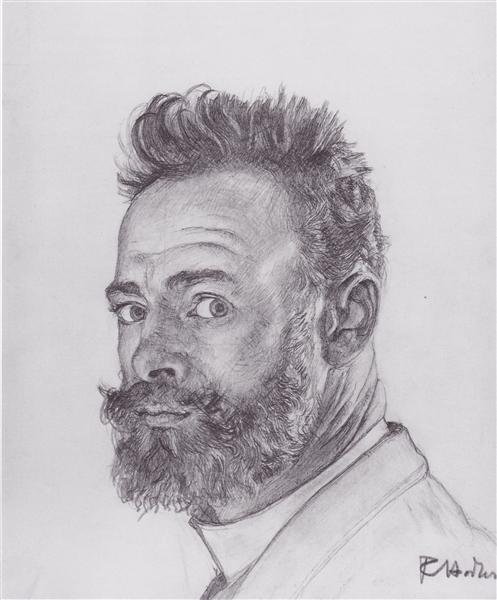Description
Ferdinand Hodler's art, an influential Swiss painter from the late nineteenth and early twentieth century, has always been celebrated by its distinctive style and deep explorations of the human condition and nature. His "Self -portrait in Paris - 1891" is a paradigmatic example of his talent, a work that offers a window to both his artistic technique and his personal perspective during this crucial period of his life.
He painting He introduces us to Hodler in what seems to be a moment of introspection. His face, central and dominator, is meticulously detailed, revealing an expression that could be interpreted as a mixture of determination and vulnerability. His gaze is penetrating, directed towards the viewer, which reinforces a direct and intimate connection. The choice of the simple background, almost empty, helps to focus all the attention on the face and the figure of the artist, eliminating any distraction and allowing the emotional intensity of the work to emerge.
The color palette used by Hodler is austere but effective. The dark tones of their clothing contrast with the paleness of their skin, creating a duality that could be interpreted as a symbol of their internal struggles and their search for clarity. This contrast is also accentuated by the light that seems to emanate from the left side of the painting, illuminating his face and highlighting his facial features with an impressive realism.
Hodler is known for his unique style, which often incorporates elements of symbolism and Art Nouveau, and "self -portrait in Paris - 1891" is no exception. Although the self -portrait may seem simple at first glance, it is actually a deeply symbolic work. Hodler's expression and the choice of colors reflect his mood during his stay in Paris, a city that was then a hotbed of artistic and cultural innovation. This work is likely to reflect its self -affirmation as an artist and its intention to leave a lasting mark on the art world.
The composition of painting It is simple but effective. Hodler has located his figure in a frontal pose, an choice that not only highlights his technical skill to portray the human anatomy, but also invites the viewer to a tête-à-tête with the artist. This frontal confrontation eliminates any barrier between the subjectivity of the artist and the spectator's perception, promoting a direct interaction that is both disturbing and captivating.
In the same way, when registering its own name and date in the painting, Hodler underlines the autobiographical nature and the historical moment of the work. It is a testimony of its identity and its location in a specific time, making this painting not only a physical representation, but also a marker on its artistic and personal journey.
The "Self -portrait in Paris - 1891" by Ferdinand Hodler is not only an impressive sample of technical and aesthetic ability, but also a work that invites a deeper reflection on the artist's place in the world. It is a work that encapsulates the complexity of the human being and the constant struggle for self -identity and recognition. Undoubtedly, this work stands out as a significant contribution in the canon of self -portrait painting and serves as a valuable piece of introspection in the life and work of Ferdinand Hodler.
KUADROS ©, a famous paint on your wall.
Hand-made oil painting reproductions, with the quality of professional artists and the distinctive seal of KUADROS ©.
Art reproduction service with satisfaction guarantee. If you are not completely satisfied with the replica of your painting, we refund your money 100%.

